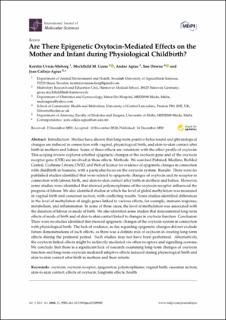Please use this identifier to cite or link to this item:
https://doi.org/10.21256/zhaw-21423| Publication type: | Article in scientific journal |
| Type of review: | Peer review (publication) |
| Title: | Are there epigenetic oxytocin-mediated effects on the mother and infant during physiological childbirth? |
| Authors: | Uvnäs-Moberg, Kerstin Gross, Mechthild M. Agius, Andee Downe, Soo Calleja-Agius, Jean |
| et. al: | No |
| DOI: | 10.3390/ijms21249503 10.21256/zhaw-21423 |
| Published in: | International Journal of Molecular Sciences |
| Volume(Issue): | 21 |
| Issue: | 24 |
| Page(s): | 9503 |
| Issue Date: | 2020 |
| Publisher / Ed. Institution: | MDPI |
| ISSN: | 1422-0067 1661-6596 |
| Language: | English |
| Subjects: | Caesarian section; Effect of oxytocin; Epigenetics; Health; Longterm effect; Oxytocin; Oxytocin receptor; Polymorphisms; Skin-to-skin contact; Vaginal birth |
| Subject (DDC): | 618.4: Childbirth |
| Abstract: | Introduction: Studies have shown that long-term positive behavioural and physiological changes are induced in connection with vaginal, physiological birth, and skin-to-skin contact after birth in mothers and babies. Some of these effects are consistent with the effect profile of oxytocin. This scoping review explores whether epigenetic changes of the oxytocin gene and of the oxytocin receptor gene (OTR) are involved in these effects. Methods: We searched Pubmed, Medline, BioMed Central, Cochrane Library, OVID, and Web of Science for evidence of epigenetic changes in connection with childbirth in humans, with a particular focus on the oxytocin system. Results: There were no published studies identified that were related to epigenetic changes of oxytocin and its receptor in connection with labour, birth, and skin-to-skin contact after birth in mothers and babies. However, some studies were identified that showed polymorphisms of the oxytocin receptor influenced the progress of labour. We also identified studies in which the level of global methylation was measured in vaginal birth and caesarean section, with conflicting results. Some studies identified differences in the level of methylation of single genes linked to various effects, for example, immune response, metabolism, and inflammation. In some of these cases, the level of methylation was associated with the duration of labour or mode of birth. We also identified some studies that demonstrated long-term effects of mode of birth and of skin-to-skin contact linked to changes in oxytocin function. Conclusion: There were no studies identified that showed epigenetic changes of the oxytocin system in connection with physiological birth. The lack of evidence, so far, regarding epigenetic changes did not exclude future demonstrations of such effects, as there was a definite role of oxytocin in creating long-term effects during the perinatal period. Such studies may not have been performed. Alternatively, the oxytocin linked effects might be indirectly mediated via other receptors and signalling systems. We conclude that there is a significant lack of research examining long-term changes of oxytocin function and long-term oxytocin mediated adaptive effects induced during physiological birth and skin-to-skin contact after birth in mothers and their infants |
| URI: | https://digitalcollection.zhaw.ch/handle/11475/21423 |
| Fulltext version: | Published version |
| License (according to publishing contract): | CC BY 4.0: Attribution 4.0 International |
| Departement: | School of Health Sciences |
| Organisational Unit: | Institute of Midwifery and Reproductive Health (IHG) |
| Appears in collections: | Publikationen Gesundheit |
Files in This Item:
| File | Description | Size | Format | |
|---|---|---|---|---|
| 2020_Uvnaes-Moberg-etal_Epigenetic-Oxytocin-mediated-effects-physiological-childbirth.pdf | 569.81 kB | Adobe PDF |  View/Open |
Show full item record
Uvnäs-Moberg, K., Gross, M. M., Agius, A., Downe, S., & Calleja-Agius, J. (2020). Are there epigenetic oxytocin-mediated effects on the mother and infant during physiological childbirth? International Journal of Molecular Sciences, 21(24), 9503. https://doi.org/10.3390/ijms21249503
Uvnäs-Moberg, K. et al. (2020) ‘Are there epigenetic oxytocin-mediated effects on the mother and infant during physiological childbirth?’, International Journal of Molecular Sciences, 21(24), p. 9503. Available at: https://doi.org/10.3390/ijms21249503.
K. Uvnäs-Moberg, M. M. Gross, A. Agius, S. Downe, and J. Calleja-Agius, “Are there epigenetic oxytocin-mediated effects on the mother and infant during physiological childbirth?,” International Journal of Molecular Sciences, vol. 21, no. 24, p. 9503, 2020, doi: 10.3390/ijms21249503.
UVNÄS-MOBERG, Kerstin, Mechthild M. GROSS, Andee AGIUS, Soo DOWNE und Jean CALLEJA-AGIUS, 2020. Are there epigenetic oxytocin-mediated effects on the mother and infant during physiological childbirth? International Journal of Molecular Sciences. 2020. Bd. 21, Nr. 24, S. 9503. DOI 10.3390/ijms21249503
Uvnäs-Moberg, Kerstin, Mechthild M. Gross, Andee Agius, Soo Downe, and Jean Calleja-Agius. 2020. “Are There Epigenetic Oxytocin-Mediated Effects on the Mother and Infant during Physiological Childbirth?” International Journal of Molecular Sciences 21 (24): 9503. https://doi.org/10.3390/ijms21249503.
Uvnäs-Moberg, Kerstin, et al. “Are There Epigenetic Oxytocin-Mediated Effects on the Mother and Infant during Physiological Childbirth?” International Journal of Molecular Sciences, vol. 21, no. 24, 2020, p. 9503, https://doi.org/10.3390/ijms21249503.
Items in DSpace are protected by copyright, with all rights reserved, unless otherwise indicated.